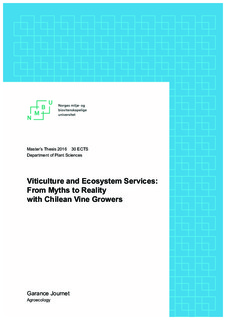| dc.contributor.advisor | Barbosa, Olga | |
| dc.contributor.advisor | Pain, Guillaume | |
| dc.contributor.advisor | Nicolaysen, Anna-Marie | |
| dc.contributor.author | Journet, Garance | |
| dc.coverage.spatial | Chile | nb_NO |
| dc.date.accessioned | 2017-05-24T10:31:29Z | |
| dc.date.available | 2017-05-24T10:31:29Z | |
| dc.date.issued | 2016 | |
| dc.identifier.uri | http://hdl.handle.net/11250/2443431 | |
| dc.description.abstract | This thesis work was led in the context of the Wine, Climate Change and Biodiversity program, coordinated since 2008 by Chilean researchers in cooperation with the biggest wine-making firms of the country and aiming at protecting the chilean native biodiversity from the chilean central mediterranean climate biomes from the agro-industry expansion. It aimed at gathering and comparing the existing scientific and experiential knowledge about the Ecosystem Services concept and its application in interactions with the different viticulture practices identified in the Chilean vineyards context. A literature review of thirty articles from the whole world and 21 semi-structured interviews were led with the viticulturists from the partner firms of the host program. Results analysis were structured around the hypotheses that 1) a knowledge gap separates the scientific knowledge collected in the articles from the experiential knowledge gathered throughout the interviews and 2) the variation of experiential knowledge between the viticulturists could potentially be explained by their management paradigm, defined as their personal qualification of the practices they apply on the vineyards they are managing. Results were compared using a conceptual diagram where the number of mentions to each ES and interaction were emphasized. Both approaches most valued the same ES. If the management paradigm defines clear differences in the viticulturists’ choices for some practices, like fertilization and weeds management, it has a reduced influence on many other practices. The global perception that viticulturists have of their vineyards doesn’t necessarily rely on their management paradigm, while it highly influences the way they integrate natural ecosystems and the ES in their practices. The complementarity of the two approaches also permitted to identify several potential research topics for the Wine, Climate Change and Biodiversity program to generate locally appropriate knowledge with direct impact on the viticulturists’ behaviour towards native ecosystems and further involvement in native biodiversity conservation. | nb_NO |
| dc.description.sponsorship | Wine, Climate Change and Biodiversity program, Chile | nb_NO |
| dc.language.iso | eng | nb_NO |
| dc.publisher | Norwegian University of Life Sciences, Ås | nb_NO |
| dc.rights | Attribution-NonCommercial-NoDerivatives 4.0 Internasjonal | * |
| dc.rights.uri | http://creativecommons.org/licenses/by-nc-nd/4.0/deed.no | * |
| dc.subject | Chile | nb_NO |
| dc.subject | Biodiversity | nb_NO |
| dc.subject | Consevation | nb_NO |
| dc.subject | Agroecology | nb_NO |
| dc.title | Viticulture and ecosystem services : from myths to reality with Chilean vine-growers | nb_NO |
| dc.type | Master thesis | nb_NO |
| dc.subject.nsi | VDP::Agriculture and fishery disciplines: 900::Agriculture disciplines: 910::Other agricultural disciplines: 919 | nb_NO |
| dc.source.pagenumber | 73 | nb_NO |
| dc.description.localcode | M-AE | nb_NO |

